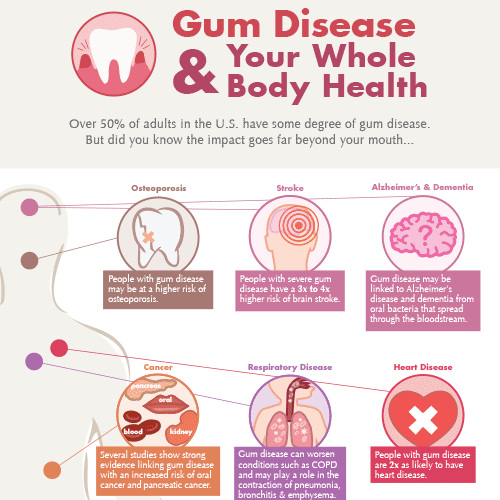According to research, having advanced gum disease may increase your risk of developing Alzheimer’s disease. Though more  studies need to be done to understand the definitive link between periodontitis and Alzheimer’s, the current research shows those with chronic gum disease for 10+ years increased their risk of developing Alzheimer’s by 70%.
studies need to be done to understand the definitive link between periodontitis and Alzheimer’s, the current research shows those with chronic gum disease for 10+ years increased their risk of developing Alzheimer’s by 70%.
Oral Bacteria & Alzheimer’s
Researchers have hypothesized that same bacteria in the mouth that causes gum disease may travel to the brain, triggering the body’s immune system to attack, which in turn kills brain cells. The diminishing number of brain cells leads to confusion and memory loss. In a recent study, researchers examined brain samples of 10 people with Alzheimer’s and 10 without; four of those with Alzheimer’s had gum disease bacteria present in their samples compared to none from the pool of non-Alzheimer’s samples.
Another study from 2019 found that P. gingivalis, one of the key oral bacteria that cuases gum disease, was found in the brains of patients with Alzheimer’s. Gingipains, which is a toxic enzyme secreted by P. gingivalis, were found in 96 percent of the 53 brain tissue samples examined. Those with increased symptoms of Alzheimer’s had higher levels of gingipains. Gingipains are nurotoxic, and have a negative impact on tau, which is a protein needed for normal brain function.
A study published in April 2021 found that adults who were cognitively healthy but have more harmful oral bacteria have a key Alzheimer’s biomarker in their cerebrospinal fluid. Both helpful and harmful bacteria levels were monitored; those with “good” bacteria had lower beta-amyloid 42 levels and those with “bad” bacteria had higher beta-amyloid 42 levels. Beta-amyloid plaque is one of two biomarkers for Alzheimer’s disease. Lower beta-amayloid 42 levels in the cerebrospinal fluid means higher amyloid levels in the brain. Currently, amyloid deposits in the brain are thought to be the first phase of Alzheimer’s disease and can occur years, maybe decades, before any mental decline is noted.
REFERENCES
Clinical and Bacterial Markers of Periodontitis and Their Association with Incident All-Cause and Alzheimer’s Disease Dementia in a Large National Survey Beydoun, Beydoun, et al. J Alzheimers Dis. 2020;75(1):157-172 doi: 10.3233/JAD-200064.
Porphyromonas gingivalis in Alzheimer’s disease brains: Evidence for disease causation and treatment with small-molecule inhibitors. Dominey, Lynch et al. 23 January 2019 https://advances.sciencemag.org/content/5/1/eaau3333
Periodontal dysbiosis associates with reduced CSF Aβ42 in cognitively normal elderly. Kamer, Pushalkar, et al. 12 April 2021 https://doi.org/10.1002/dad2.12172

